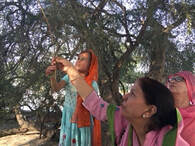
Charity for God’s Sake has a hundred signs-within the heart
The good deed, a hundred tokens though in Charity Riches are Consumed
A Hundred Lives come to Heart in Return
A Sowing of Good Deeds in God’s Earth and Then no Income Impossible
- Rumi
In Pakistan, we spent our first night in Lahore. The persons traveling without a companion were assigned a roommate. My roommate was a short and stout Sikh gentleman from Indiana, USA. In the morning at around 3:30 am, the whole air space in the room started reverberating with the sound of beautiful recitation of morning compositions of Gurbani (Guru’s Words). Sitting on his bed, the gentleman was reciting in hypnotic trance. Like the pied piper, he had taken me into the wordless world of elevated state of mind. Over the next nine days, we would end up developing an enigmatic warmth for each other.
After having breakfast, our group of 37 or so people headed out to Gurudwara Sacha Sauda. According to the legend, Guru Nanak’s father was not happy with his ways and wanted him to be productive and earn money. One day, he gave him 80 rupees and asked him to strike a true bargain with the money and earn a very handsome profit. He sent his friend Mardana with him. Instead of doing what his father wanted, Guru Nanak bought food, and cloths for beggars, persons discarded by society, lowest among the low casts, and sick to no end. Both him and Mardana distributed the food and clothes with sheer joy. The Gurdwara is built on the very site where Baba Nanak showed us the path of giving to needy.
I found the Gurdwara to be beautifully maintained with manicured lawns and clean buildings. We all sat in the prayer hall and listened to the Kirtan (sacred hymns) by the priest as well as some members of our group. We were served Langar (food from the community kitchen) after the end of singing and prayer. To my surprise, two of the servers were Muslims and while serving they were reciting Sikh chants. There were also two little kids age around 6 or 7 distributing food.
There was a big berry tree on the right side of the main hall’s entrance. The tree is believed to be over 600 years old, and it is believed that Baba Nanak used to sit under the tree and muse about the nature of God. The locals believe in the healing power of its leaves. Almost all of us took some leaves.
Reflecting on this episode, I realize that even at the young age of 18, Guru Sahib had a compassionate heart. Reading about the episodes of his earlier life, I (we) know that he had mind of his own. He objected to wearing of sacred thread, did not want to perform in rituals, questioned rationality of society’s beliefs and actions and did not want to indulge in any activity which did not allow him to grow spiritually. In short, he was a non-conformist. He was like a boat which in order to navigate stays in contact with the water (society/community) for travel, but in order to keep itself moving, does not allow societal ills to seep in.
In discovering his true nature, he did not follow his father and mother’s aspirations. Baba Nanak throughout his life taught that the true human bliss is in service of living beings. One shall choose the path based ion his/her calling. Baba Nanak was not an arm chair teacher but walked the path.
He made giving and service (Daan) as one of the three pillars of the Sikh path. The other two he shared were Meditation (Naam), and living a virtuous life (Isnaan). Jesus who lived centuries before him emphasized service of mankind as one of his principle teachings. Jesus spent most of his time with lepers, persons discarded by the society and prostitutes. Baba Nanak also like him spent his time helping poor, needy and sick. In Sikh teachings, while one is encouraged to help the needy and sick, the healthy and capable persons are scolded for begging. The following lines clearly show Guru’s thinking:
Is Pekhe Thavuh Girhe Bhala Jithoh Ko Varsae
(Instead of wearing the beggar’s robes, it is better to be a householder, and give to others)
The teachings remind us that service is gratitude which brings grace into the life. Service is humility and any giving of items of no use to the giver is not a true act of charity, but more an ego filled feel good activity. In the old Hindu scripture Katopanishad, Nachiketa tells his father that giving up old useless cows to Brahmins with fanfare was self-aggrandizing and an act frowned upon by Gods.
He emphasized that service should not only be a duty but should become a habit. In Guru Nanak life time, inspired by his teachings, there was spread of community kitchens far and wide. The care of needy and sick was done by his followers and showing the path to the existence to move onto more enlightened path. When I think about it, the following words ring through my ear:
Sage does nothing but nothing is left undone
-Lao Tsu
I was writing these last lines around the time of sunset. The orange sky and green lawn together had created a picture evoking nostalgia for the place and mind was being ambushed by the memories of my visit.
 RSS Feed
RSS Feed